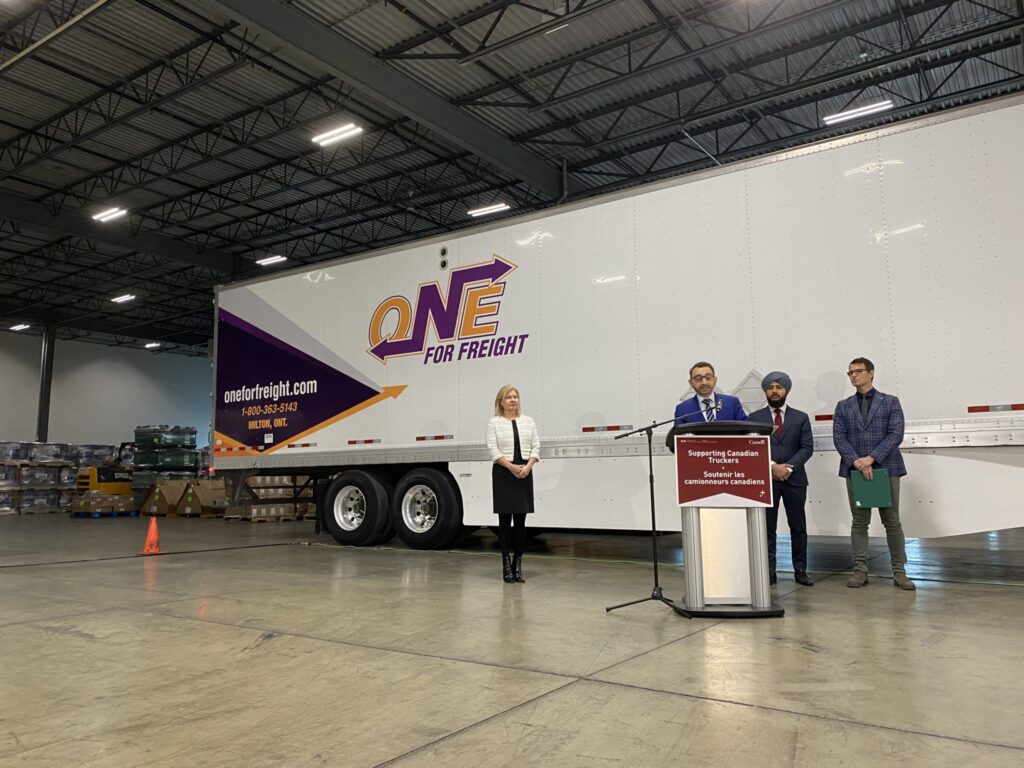Millions in federal funding to train, onboard new truck drivers
Arjit Singh is investing the time to train for a new career in trucking, and Canada’s federal government is investing in him throughout the journey.
The One for Freight employee is one of the first candidates to benefit from $43 million in federal funding to train and onboard up to 2,600 new truck drivers and other industry workers through Trucking HR Canada’s Career ExpressWay Program.
“It is going really good,” the former dock supervisor said Monday morning, as the program was formally announced behind him. “[Fleet trainers and mentors] teach me how to tackle the day-to-day situations, how to be on the road carefully, the responsibilities.” And he added that he looks forward to a job that pays well and offers a sense of responsibility.

The program itself offers up to $20,000 to prepare each truck driver, with up to half of that available for entry-level training, and a similar amount to fund onboarding, mentoring, and finishing programs.
Another $3 million in funding has been provided to help Trucking HR Canada update a national occupational standard for entry-level and occupational-level truck drivers, and use Census data to update labor market information data.
While the actual cost of establishing a job-ready truck driver is closer to $25,000, the federal funding helps “take the edge off”, said One for Freight CEO David Carruth, welcoming the initiative.
Graduates of entry-level driver training programs still need further support, he stressed, referring to other layers that include mentorships and internal training programs.
Canada’s truck driver shortage
And Canada undeniably needs new job-ready truck drivers.
“Truck drivers are critical to our supply chains,” Transport Minister Omar Alghabra said, noting that the shortage of truck drivers was a central theme in a report by the National Supply Chain Task Force.
“Right now, this industry has about 27,000 truck driver vacancies. About one in three truck drivers in Canada — 32% — is 55 years or older compared to one in five workers, just 22%, in the entire Canadian labor force. If nothing is done, this truck driver shortage will continue to increase to a point where it is estimated that it could reach over 55,000 vacancies by the end of this year.”
Admitting that the announcement will not solve the shortage on its own, it will help align talent and job opportunities, he said.
“This funding will provide training subsidies and wage subsidies to support the recruitment, training and onboarding of up to 1,400 new truck drivers and 1,200 workers in other in-demand occupations in the trucking sector.”

Supporting the supply chain
“The labor shortages in the trucking sector are putting pressure on the prices and availability of [available] goods,” added Angela Splinter, CEO of Trucking HR Canada. “With the cost of living already climbing for Canadians from coast to coast, this investment today will help employers across the country in getting the workers they need – which will, in turn, help to move the goods that Canadians need.”
The Canadian Trucking Alliance (CTA) was among the first industry groups to welcome the program.
“CTA and the provincial associations have worked very hard to raise awareness to the federal government of the need to bring in new employees, including safe and professionally trained drivers who can be deployed in support of our customers and the supply chain,” CTA chairman Greg Munden said in a press release.
“When the economy’s doing well, trucking companies do well, and when trucking companies do well, the economy does well. So we want to make sure that that relationship continues to be strong,” Alghabra added. “When it’s strong, it attracts even more people.”

Checks and balances for training
The funding is available for any fleet, but applicants will need to ensure that the supported training aligns with federal mandatory entry-level training requirements, submit pay stubs, and show source deductions. The source deductions would exclude so-called Driver Inc. fleets that misclassify employees as independent contractors.
“There are a lot of checks and balances — from reporting, to potential audits, to verification,” Alghabra said, responding to a question from TruckNews.com. “We’ve worked with Trucking HR [Canada] on many different projects in the past, and there’s an ongoing understanding of what [the] public’s expectations are, what the industry needs are, and we work together.”
Truck driver training will also be on the agenda later this week when the Council of Ministers meets in Ottawa, the transportation minister added.
“Trucking schools are incredibly important to the future of the industry.”
Have your say
This is a moderated forum. Comments will no longer be published unless they are accompanied by a first and last name and a verifiable email address. (Today's Trucking will not publish or share the email address.) Profane language and content deemed to be libelous, racist, or threatening in nature will not be published under any circumstances.
You can come up with any program and spend tax payers money nothing will change if you don’t address drivers pay and working conditions. Ask your self do you want to live in a can, smell bad sometimes, not having conditions of higeyne as at home, being away for long periods at a time from family? Make the pay worth it and I guarantee there won’t be a driver shortage to the point you’d have only the good and responsible ones on the road.
-
Well said
-
Gov should not be using tax $ for this while sick and injured drivers end up with certain medical care and end up in homeless shelters. Fix the hourly pay and treatment and reduce turn over to 25% and a plan to bring in new drivers through farmers and and gov $ to ass with insurance and a 1 cent / km industry paid training program
All nice and a great, but if you bring all the new drivers on board, make sure that the doors open for some US Truckstop operators to open more places up here too. There have to be sufficient safe parking spaces. Why am I saying this? Easy none of the Canadian Truckstop operators gives 2 shoots about us
How about some money for truck parking across the country.
I’m sorry to say, this sounds like a scam… $20,000 to train a new driver, when I started years ago, it didn’t cost me $5,000, to learn at a reputable school in Alberta. Someone is pocketing a lot of cash. And I feel, once again, the new immigrants are getting too much help, while us folks, who actually are born Canadian, get nothing.
-
Maria-most trades are 3 to 5 years, trucking so far is minimal training, the reason commercial accidents have grown over the last 30 years. A course should be at least a year to acquire understanding of the skills to be a “Professional driver”.
This industry will never change, unless you invest in proper schools and training! Most of these new drivers that have so called “training” can not successfully pass my in house pre employment road test which includes a proper pre trip inspection.
How about the government invest in real training!
Am interested in the programme how do you enrole and what are the requirements
Yes we are short of drivers but company’s don’t pay loading and unloading time which takes up depending on the load can take most of the day. Plus low wages and you have to buy food while n the road . I could go on but I think you understand what I am saying.
I am a retired truck driver
Give all the money to off shore drivers and cdn drivers go with out
-
Well said
are there any plans to open up and allow foreign drivers to come and work in canada. An already licenced driver is cheaper to certify into Canada standards than training a driver from scratch.
-
We need to set a min rate of pay with houry pay and overtime first
-
Im currently working on that for my company. Where are you from?
How do i get more information on this program?
That is all well and good. But…Until the Government ends Driver Inc. the problems the trucking industry is facing will continue. I can name you 4 drivers that went through a mentorship training program only to quit for a driver inc. Scam.
End it now!
Hi, My name is Rishi Bharani I have 10 years driving experience and I am running transport company from last 10 years dealing with new and experience drivers.